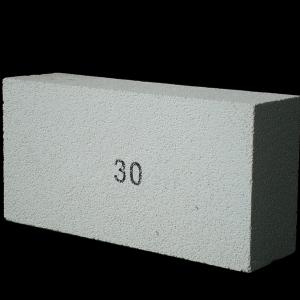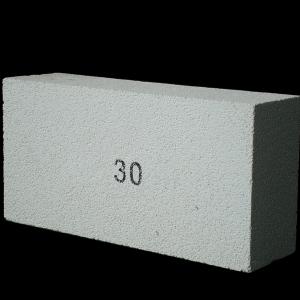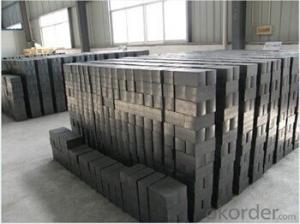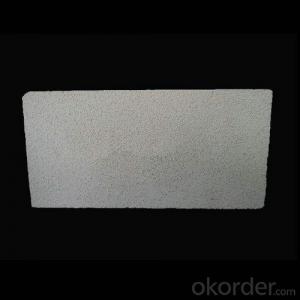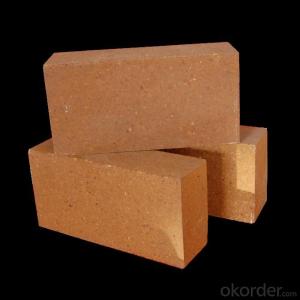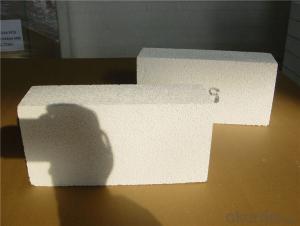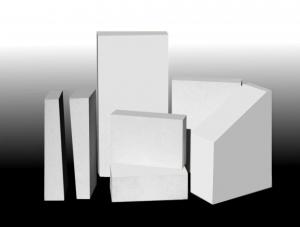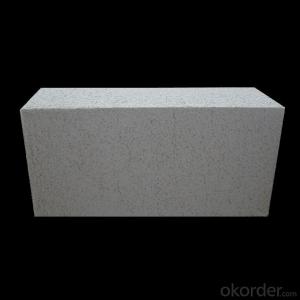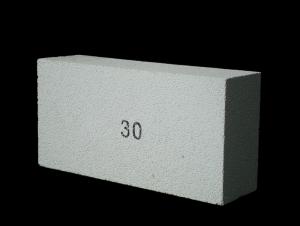Insulating Fire Brick
- Loading Port:
- China Main Port
- Payment Terms:
- TT or L/C
- Min Order Qty:
- 1000 Pcs m.t.
- Supply Capability:
- 1000 Tons Per Month m.t./month
OKorder Service Pledge
OKorder Financial Service
You Might Also Like
General Information of Insulating Fire Brick
Our insulating firebricks are classified under temperature range from 1300℃ to 1700℃.Our insulating fire bricks are manufactured from high purity alumina clay.
Feature of Insulating Fire Brick
Light weight and low thermal conductivity
Low heat storage
Low iron and impurities
High thermal shock resistance
Application of Insulating Fire Brick
Our insulating firebricks can be used as a hot face lining directly exposed to the heat or as a backup insulation layer in iron and steel mills, non-ferrous foundries, petrochemical, ceramic, glass.
Technical Data of of Insulating Fire Brick
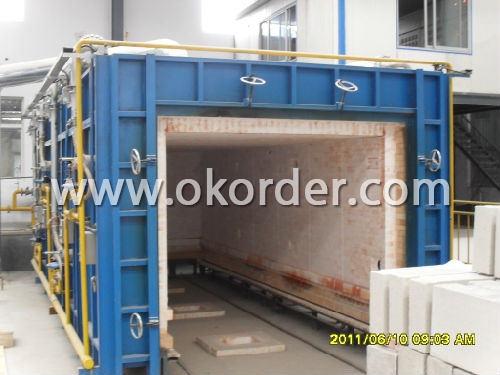
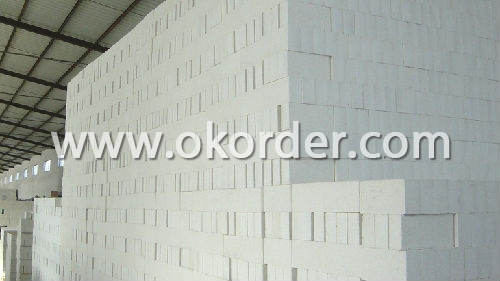
- Q:Can insulating fire bricks be used in the construction of refractory coatings?
- Yes, insulating fire bricks can be used in the construction of refractory coatings. Insulating fire bricks are designed to have low thermal conductivity, which means they are excellent at preventing heat transfer. This makes them ideal for use in refractory coatings, which are used to protect structures from high temperatures. Refractory coatings are applied to surfaces that are exposed to extreme heat, such as furnaces, kilns, and chimneys. These coatings provide a layer of insulation that helps to retain heat, prevent damage to the underlying structure, and improve energy efficiency. Insulating fire bricks can be used as a base layer in the construction of refractory coatings. They can be stacked and bonded together to form a solid and heat-resistant surface. This layer acts as a barrier to prevent heat from transferring through to the underlying structure. In addition to their low thermal conductivity, insulating fire bricks also have other properties that make them suitable for use in refractory coatings. They have high temperature resistance, meaning they can withstand the extreme heat generated in industrial applications. They are also lightweight and easy to handle, making them convenient to install and work with. Overall, insulating fire bricks are a reliable option for constructing refractory coatings. They provide excellent insulation and protection against high temperatures, making them a valuable component in the construction of heat-resistant structures.
- Q:Can insulating fire bricks be used in the construction of heat shields?
- Certainly, heat shields can indeed be constructed using insulating fire bricks. These bricks are specifically designed to withstand elevated temperatures and possess exceptional thermal insulation properties. Their ability to effectively absorb and distribute heat makes them an ideal choice for the creation of heat shields, which serve to safeguard against excessive heat and mitigate thermal damage. In industries that involve high temperatures, such as steel, glass, and ceramics, insulating fire bricks are frequently employed. Moreover, their lightweight nature and ease of handling make them a practical option for constructing portable or easily installable heat shields. In summary, insulating fire bricks are a reliable and appropriate material for constructing heat shields in a diverse range of applications.
- Q:Do insulating fire bricks expand and contract with temperature changes?
- Yes, insulating fire bricks do expand and contract with temperature changes.
- Q:What is the lifespan of insulating fire bricks?
- The lifespan of insulating fire bricks can vary depending on various factors. Typically, these bricks are designed to be long-lasting and can endure for numerous years or even decades if correctly installed and maintained. The longevity of insulating fire bricks is significantly influenced by their quality. Superior materials and manufacturing processes used in the production of high-quality bricks tend to result in a longer lifespan compared to lower-quality bricks. It is important to select bricks from reputable manufacturers who abide by stringent quality control standards. The application and conditions under which insulating fire bricks are used also play a crucial role. If exposed to extreme temperatures, such as in furnaces or kilns, the bricks may undergo thermal shock and degradation over time. Similarly, exposure to corrosive chemicals or abrasive materials can also impact the bricks' lifespan. To maximize the lifespan of insulating fire bricks, proper installation and maintenance are essential. They should be installed in accordance with the manufacturer's guidelines, ensuring proper alignment and support. Regular inspections should be carried out to detect any signs of damage or wear, with prompt repairs or replacements made as necessary. In conclusion, while the exact lifespan of insulating fire bricks cannot be determined with absolute certainty, it is reasonable to expect them to endure for several years to several decades when used in suitable applications and maintained appropriately.
- Q:How do insulating fire bricks perform in terms of sound insulation?
- Insulating fire bricks are primarily designed to provide excellent thermal insulation, but their performance in terms of sound insulation may vary. While they can offer some level of sound reduction due to their dense and non-porous nature, they are not specifically engineered for soundproofing purposes. The level of sound insulation provided by insulating fire bricks will depend on various factors such as brick thickness, density, and the frequency of the sound. In general, insulating fire bricks can help reduce high-frequency noises to some extent, but they may not be as effective in blocking low-frequency sounds. For better sound insulation, specialized acoustic materials or construction techniques may be more suitable.
- Q:Are insulating fire bricks resistant to moisture penetration?
- Insulating fire bricks exhibit resistance to moisture penetration, as they are designed with low porosity, resulting in a minimal water absorption rate. This attribute grants them formidable protection against moisture infiltration. These bricks find frequent application in environments characterized by elevated temperatures and harsh conditions, including kilns, furnaces, and fireplaces. Their durability and effectiveness in such settings are guaranteed by their ability to ward off moisture penetration.
- Q:What is the bulk density of the sintered bricks?
- Sludge brick density is about 1000Kg/m or so fand.
- Q:Do insulating fire bricks require any curing or drying time before use?
- Yes, insulating fire bricks do require curing or drying time before use. This is because the manufacturing process of these bricks involves the use of binders and additives that need to be cured or dried to ensure proper performance and durability. The curing or drying process allows these materials to harden and solidify, enhancing the insulating properties of the bricks. Failure to properly cure or dry the bricks before use may result in reduced insulation efficiency and potential damage to the bricks during the heating process. It is recommended to follow the manufacturer's instructions regarding the specific curing or drying time required for the insulating fire bricks to ensure optimal performance.
- Q:Are insulating fire bricks suitable for insulation in boilers?
- Yes, insulating fire bricks are suitable for insulation in boilers. Insulating fire bricks are made from lightweight materials such as clay and alumina, which have excellent insulating properties. They have a low thermal conductivity, meaning they are effective at preventing heat transfer and can help to significantly reduce heat loss in boilers. Additionally, insulating fire bricks are resistant to high temperatures, making them suitable for use in boilers where high heat is generated. They are also durable and can withstand the harsh conditions inside a boiler, including exposure to intense heat and corrosive gases. Overall, insulating fire bricks are a popular choice for boiler insulation due to their thermal efficiency and ability to withstand high temperatures.
- Q:Can insulating fire bricks be used in outdoor fire pits?
- Yes, insulating fire bricks can be used in outdoor fire pits. Insulating fire bricks are designed to withstand high temperatures and provide excellent insulation, making them suitable for outdoor fire pits where heat retention and durability are important.
1. Manufacturer Overview |
|
|---|---|
| Location | Shandong, China |
| Year Established | 2007 |
| Annual Output Value | Above US$ 5 Million |
| Main Markets | 10.00% Northern Europe 30.00% North America 30.00% Eastern Asia 5.00% Africa 10.00% Southeast Asia 15.00% Western Europe |
| Company Certifications | ISO 9001:2008 |
2. Manufacturer Certificates |
|
|---|---|
| a) Certification Name | |
| Range | |
| Reference | |
| Validity Period | |
3. Manufacturer Capability |
|
|---|---|
| a)Trade Capacity | |
| Nearest Port | Qingdao Port |
| Export Percentage | 90% |
| No.of Employees in Trade Department | 10 |
| Language Spoken: | English; Chinese |
| b)Factory Information | |
| Factory Size: | Above 16,000 square meters |
| No. of Production Lines | Above 3 |
| Contract Manufacturing | OEM Service Offered; Design Service Offered |
| Product Price Range | High; Average |
Send your message to us
Insulating Fire Brick
- Loading Port:
- China Main Port
- Payment Terms:
- TT or L/C
- Min Order Qty:
- 1000 Pcs m.t.
- Supply Capability:
- 1000 Tons Per Month m.t./month
OKorder Service Pledge
OKorder Financial Service
Similar products
New products
Hot products
Related keywords
